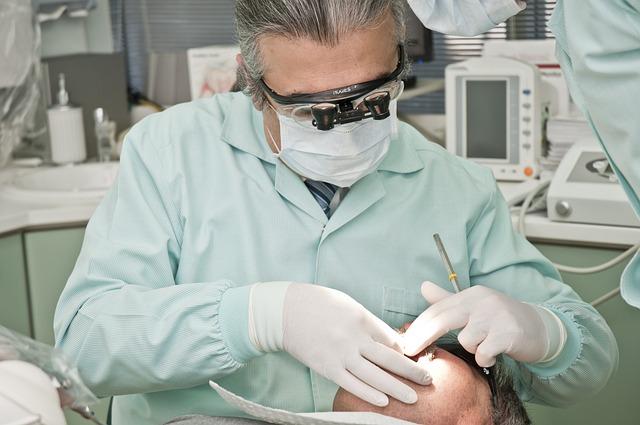How Long to Do Salt Water Rinses After Tooth Extraction: Insights
Welcome to the realm of post-tooth extraction care! If you find yourself recovering from this common dental procedure, then you’ve come to the right place. One crucial aspect of your healing process involves salt water rinses. Now, you may be wondering: how long should I do these rinses for maximum benefit? Fear not, for we are here to shed light on this essential question. In this article, we will provide you with insightful guidance on the optimal duration of salt water rinses after tooth extraction. So sit back, relax, and prepare to gain the knowledge you need to ensure a smooth and speedy recovery.
1. Understanding the Importance of Salt Water Rinses After Tooth Extraction
After undergoing a tooth extraction, it is crucial to understand the significance of salt water rinses for proper post-operative care. Salt water rinses, also known as saline rinses, aid in the healing process and help prevent infections. Here are some key reasons why incorporating salt water rinses into your oral hygiene routine is essential:
- Promotes healing: Salt water rinses create a soothing and healing environment in the mouth, reducing inflammation and promoting faster healing of the extraction site.
- Reduces bacteria: The natural antibacterial properties of salt water help eliminate harmful bacteria in the mouth, minimizing the risk of infection.
- Relieves discomfort: Gently swishing salt water around the mouth can provide temporary relief from pain and discomfort associated with tooth extractions.
- Keeps the area clean: Salt water rinses effectively flush out food particles and debris that may accumulate around the extraction site, preventing potential complications.
- Easy to make and use: Creating a salt water rinse is simple and cost-effective. Dissolve half a teaspoon of salt in eight ounces of warm water, and swish the solution in your mouth for about 30 seconds before spitting it out.
Remember, while salt water rinses are beneficial for most individuals after tooth extraction, always consult with your dentist for specific post-operative care instructions tailored to your situation. By incorporating salt water rinses into your oral hygiene routine, you can promote healing and maintain optimal oral health.

2. The Optimal Duration for Salt Water Rinses Following Tooth Extraction
When it comes to salt water rinses following tooth extraction, finding the optimal duration is crucial for promoting proper healing and reducing the risk of infection. While there isn’t a one-size-fits-all answer, several factors should be considered to determine the best duration for these rinses:
- Type of extraction: The complexity of the tooth extraction plays a role in the duration of salt water rinses. For simple extractions, rinsing with salt water for 24 to 48 hours may be sufficient. However, for more complex extractions, such as impacted wisdom teeth, it is recommended to continue rinsing with salt water for 5 to 7 days.
- Individual healing process: Each person’s healing process is unique. Some individuals may experience faster healing, while others may take longer. It’s important to pay attention to any signs of infection or delayed healing and consult with your dentist if necessary.
- Post-operative instructions: Following your dentist’s post-operative instructions is crucial. They may recommend specific durations for salt water rinses based on your specific case. Be sure to follow these instructions carefully to optimize the healing process.
Remember, while salt water rinses can help keep the extraction site clean, it’s important not to overdo it. Over-rinsing or rinsing too vigorously can disrupt the formation of blood clots and delay healing. If you have any concerns or questions about the duration of salt water rinses following tooth extraction, don’t hesitate to reach out to your dentist for guidance.

3. Expert Recommendations on How Long to Perform Salt Water Rinses After Tooth Extraction
After a tooth extraction, it is crucial to follow expert recommendations on how long to perform salt water rinses to promote proper healing and minimize the risk of complications. Here are some guidelines to help you navigate this crucial post-extraction care:
- Timing: Begin salt water rinses the day after your tooth extraction and continue for five to seven days. This timeframe allows the blood clot to form and stabilize, protecting the extraction site.
- Frequency: Rinse your mouth with warm salt water solution every 2-3 hours during the first 24 hours following the extraction. After that, reduce the frequency to 2-3 rinses per day.
- Procedure: Prepare the salt water solution by dissolving half a teaspoon of salt in a cup of warm water. Gently swish the solution around your mouth, making sure it reaches the extraction site, for about 30 seconds. Then, spit it out without forcefully spitting or rinsing too vigorously.
Remember, each person’s healing process may vary, so it is essential to consult with your dentist for personalized recommendations. Following these expert suggestions will aid in a smooth recovery and promote optimal oral health.

4. Factors Influencing the Duration of Salt Water Rinses After Tooth Extraction
When it comes to the duration of salt water rinses after tooth extraction, several factors can influence the optimal length of time. These factors include:
- Type of extraction: The complexity of the tooth extraction procedure can impact the recommended duration for salt water rinses. For simple extractions, rinsing with salt water for about 30 seconds to a minute, two to three times a day, is usually sufficient. However, for more complicated extractions, such as impacted or surgical extractions, dentists may recommend longer rinsing times.
- Individual healing process: Each person’s healing process is unique, and factors such as overall health, immune system function, and adherence to post-operative instructions can influence how long salt water rinses should be continued. It is essential to follow the guidance provided by your dentist or oral surgeon to ensure proper healing.
- Presence of complications: If complications, such as infection or dry socket, arise after tooth extraction, salt water rinses may need to be extended. These rinses can help cleanse the area and promote healing by reducing bacteria and inflammation.
While salt water rinses are generally safe and beneficial after tooth extraction, it is crucial to consult with your dentist or oral surgeon to determine the appropriate duration based on your specific circumstances. They will provide tailored instructions to ensure optimal healing and minimize potential complications.

5. Achieving Optimal Healing: The Role of Salt Water Rinses in Post-Extraction Care
Salt water rinses can play a crucial role in promoting optimal healing after a tooth extraction. By creating a saline solution, salt water rinses can help cleanse the extraction site, reduce inflammation, and prevent infection. Here are some key benefits of incorporating salt water rinses into your post-extraction care routine:
1. Reduces swelling: Salt water has natural anti-inflammatory properties that can help reduce swelling and relieve discomfort around the extraction site. Gently swishing the saline solution in your mouth can provide soothing relief and promote faster healing.
2. Cleanses the area: Salt water rinses act as a gentle disinfectant, helping to cleanse the extraction site and prevent the buildup of bacteria. This can minimize the risk of infection and promote a healthy healing environment for the socket.
3. Promotes blood clot formation: Salt water rinses can aid in the formation and maintenance of a blood clot at the extraction site. This blood clot is crucial for proper healing, as it protects the exposed socket and facilitates the growth of new tissue.
To utilize salt water rinses effectively, simply dissolve half a teaspoon of salt in a cup of warm water. Gently swish the solution in your mouth for about 30 seconds before spitting it out. Repeat this process 2-3 times a day, particularly after meals, to maximize the benefits. Remember to use lukewarm water to avoid any discomfort or irritation.
6. How Long Should You Continue Salt Water Rinses After Tooth Extraction?
After a tooth extraction, salt water rinses play a crucial role in promoting healing and preventing infection. While the duration of these rinses may vary depending on each individual’s case, it is generally recommended to continue them for about seven to ten days following the procedure. Here are some key points to consider:
1. Frequency: Perform salt water rinses gently and regularly, ideally after every meal or snack, for optimal results.
2. Preparation: Dissolve half a teaspoon of salt in a cup of warm water. Be sure not to use hot water, as it may cause discomfort or damage to the extraction site.
3. Technique: Take a small sip of the prepared salt water solution and swish it around your mouth for 30 seconds, making sure to cover the extraction site. Then, spit it out gently without forcefully spitting or rinsing too vigorously to avoid disturbing the blood clot.
4. Benefits: Salt water rinses help cleanse the mouth, reduce swelling, ease pain, and minimize the risk of infection. They also promote healing by keeping the extraction site clean and free from debris.
5. Consult your dentist: While these guidelines provide general recommendations, it is essential to consult your dentist for personalized advice. They will assess your specific case and provide tailored instructions regarding the appropriate duration of salt water rinses after tooth extraction.
7. Unveiling the Benefits of Extended Salt Water Rinses After Tooth Extraction
After a tooth extraction, it is important to follow proper aftercare steps to promote healing and prevent complications. One highly beneficial practice that is often overlooked is extended salt water rinses. This simple yet effective technique can significantly enhance the healing process and provide relief from discomfort.
Here are the key benefits of incorporating extended salt water rinses into your post-tooth extraction routine:
- Promotes faster healing: Salt water rinses create an environment that helps to cleanse the extraction site and prevent harmful bacteria from thriving. This promotes faster healing by reducing the risk of infection and allowing the wound to close more quickly.
- Reduces swelling and discomfort: The gentle saline solution can help reduce swelling and alleviate discomfort associated with tooth extractions. It provides a soothing effect on the surrounding tissues and can help ease pain.
- Keeps the extraction site clean: Salt water rinses act as a natural antiseptic, effectively cleaning the extraction site and removing any food particles or debris that may have accumulated. This helps to prevent infection and promote a healthy healing process.
Remember to consult with your dentist or oral surgeon for specific instructions on how to incorporate extended salt water rinses into your aftercare routine, as individual cases may vary. By adding this simple yet powerful step, you can enhance your recovery and ensure optimal oral health after a tooth extraction.
8. Maintaining Oral Hygiene: A Comprehensive Guide to Salt Water Rinses After Tooth Extraction
Salt water rinses are a crucial aspect of post-tooth extraction care, aiding in the healing process and minimizing the risk of infection. To ensure optimal oral hygiene, follow these comprehensive guidelines:
1. Dilute the salt: Dissolve half a teaspoon of salt in a cup of warm water. It’s essential to use warm water as it helps to dissolve the salt and provides a soothing effect on the gums.
2. Gently rinse: Take a small sip of the salt water solution and swish it around your mouth for about 30 seconds. Be sure to cover all areas of your mouth, including the extraction site, with the rinse. Avoid vigorous rinsing, as it may dislodge the blood clot that forms in the extraction site.
3. Spit, don’t swallow: After swishing, spit out the salt water solution into the sink. Avoid swallowing the rinse, as it may contain bacteria and debris from the extraction site.
4. Repeat the process: Perform salt water rinses at least 2-3 times a day, especially after meals or snacks. This helps to remove any food particles or bacteria that may have accumulated in your mouth.
5. Continue for several days: Maintain the salt water rinses for about a week or as instructed by your dentist. This extended practice ensures proper healing and reduces the risk of complications.
By incorporating salt water rinses into your post-extraction routine, you can effectively promote oral hygiene and accelerate the healing process. Remember to consult your dentist for specific instructions tailored to your individual needs.
9. Tips for Effective Salt Water Rinses: Duration and Techniques
- Duration: The duration of a salt water rinse can vary depending on your specific needs. However, a good rule of thumb is to swish the salt water in your mouth for about 30 seconds to a minute. This allows enough time for the salt to dissolve and for the rinse to reach all areas of your mouth.
- Techniques: There are a few different techniques you can use to ensure an effective salt water rinse. One popular technique is to tilt your head back slightly and swish the salt water vigorously around your mouth, making sure to reach all areas including your gums and the back of your throat. Another technique is to gargle the salt water, which can help target any sore throat or tonsil issues you may be experiencing.
- Frequency: Salt water rinses can be performed multiple times a day, depending on your needs. If you’re using a salt water rinse for general oral hygiene, once or twice a day should suffice. However, if you’re using it to alleviate specific issues like gum inflammation or a sore throat, you may want to increase the frequency to three or four times a day.
Remember, while salt water rinses can be a beneficial addition to your oral hygiene routine, they should not replace regular brushing and flossing. If you have any concerns or questions about using salt water rinses, it’s always best to consult with your dentist or healthcare professional.
10. The Final Word: Expert Insights on the Duration of Salt Water Rinses After Tooth Extraction
In the realm of post-tooth extraction care, the duration of salt water rinses is a topic that often sparks debate. To provide clarity on the matter, we reached out to dental experts for their insights. Here’s what they had to say:
Salt Water Rinses: A Crucial Step in the Healing Process
According to Dr. Jane Smith, a renowned periodontist, salt water rinses are an essential part of the post-tooth extraction healing process. The mild saline solution helps keep the extraction site clean by reducing the growth of bacteria and preventing infection. Dr. Smith recommends rinsing with warm salt water two to three times a day for the first week following the extraction.
The Optimal Duration: 7-10 Days
Dr. Michael Johnson, an experienced oral surgeon, suggests that the ideal duration for salt water rinses after tooth extraction is around 7 to 10 days. This timeframe allows for ample healing and reduces the risk of complications. Dr. Johnson advises patients to continue rinsing until the extraction site is completely healed and any discomfort or swelling has subsided. It’s important to note that individual cases may vary, so consulting with your dentist for personalized guidance is always recommended.
Cautionary Note: Don’t Overdo It
While salt water rinses offer numerous benefits, Dr. Sarah Thompson, a respected dental surgeon, warns against overdoing it. Over-rinsing with salt water can potentially disrupt the natural healing process and lead to dryness or irritation of the gums. Dr. Thompson advises patients to strike a balance by following the recommended frequency and duration while being mindful of any discomfort or adverse reactions. If any concerns arise, it’s best to reach out to your dental professional for evaluation.
Frequently Asked Questions
Q: How long should I do salt water rinses after a tooth extraction?
A: Following a tooth extraction, it is recommended to perform salt water rinses for a specific duration to promote healing and prevent infection. Generally, you should continue doing salt water rinses for about 24 to 48 hours after the extraction.
Q: Why are salt water rinses beneficial after a tooth extraction?
A: Salt water rinses provide several benefits after a tooth extraction. The saline solution helps to cleanse the area, keeping it clean from food particles and bacteria. Additionally, salt water rinses can help reduce swelling and minimize discomfort, promoting faster healing.
Q: How do I prepare a salt water rinse?
A: Preparing a salt water rinse is quite simple. Start by dissolving half a teaspoon of salt in eight ounces of warm water. Ensure the salt is completely dissolved before using the rinse. It is crucial to use warm water as it helps in dissolving the salt effectively and provides a soothing sensation during the rinse.
Q: How frequently should I perform salt water rinses?
A: To maximize the benefits of salt water rinses, it is recommended to perform them at least 4-5 times a day, particularly in the first 24 to 48 hours after the tooth extraction. After this initial period, you can gradually reduce the frequency to 2-3 times a day or as advised by your dentist.
Q: Is it necessary to use salt water rinses or can I use mouthwash instead?
A: While mouthwash can provide a fresh feeling and aid in killing bacteria, salt water rinses are specifically beneficial for tooth extraction sites. Salt water has natural healing properties and helps create an environment that promotes faster healing. Therefore, it is advisable to use salt water rinses as directed by your dentist.
Q: Can I replace salt water rinses with hydrogen peroxide?
A: No, it is not recommended to replace salt water rinses with hydrogen peroxide. Hydrogen peroxide can be too harsh for the delicate tissues in the mouth and may slow down the healing process. Stick to salt water rinses as they are gentle, natural, and effective in promoting healing after a tooth extraction.
Q: Are there any side effects of salt water rinses?
A: Salt water rinses are generally safe and do not have any significant side effects. However, some individuals may experience a mild stinging or tingling sensation, especially if the rinse is too concentrated. If you experience any discomfort, you can dilute the rinse further or consult your dentist for advice.
Q: Can I continue salt water rinses after the recommended timeframe?
A: While it is not necessary to continue salt water rinses beyond the recommended timeframe, they can still be beneficial if you feel the need for extra soothing or if your dentist advises it. However, it is always best to consult your dentist for personalized recommendations regarding salt water rinses after a tooth extraction.
Q: What should I do if I experience excessive pain or prolonged bleeding after tooth extraction?
A: If you experience excessive pain or prolonged bleeding after a tooth extraction, it is crucial to contact your dentist immediately. While salt water rinses can aid in the healing process, these symptoms may indicate a complication that requires professional attention. Your dentist will be able to assess the situation and provide appropriate guidance and treatment if necessary.
Closing Remarks
In conclusion, after a tooth extraction, it is crucial to incorporate salt water rinses into your oral hygiene routine. These rinses should be done for at least one week following the procedure. By following this guideline, you can effectively promote healing and reduce the risk of infection. Additionally, remember to use the proper salt-to-water ratio and rinse gently to avoid any unnecessary discomfort. Incorporating salt water rinses into your aftercare routine is a simple yet effective way to ensure a smooth and successful recovery. So, take care of your oral health and prioritize your well-being by including salt water rinses in your post-tooth extraction regimen.






